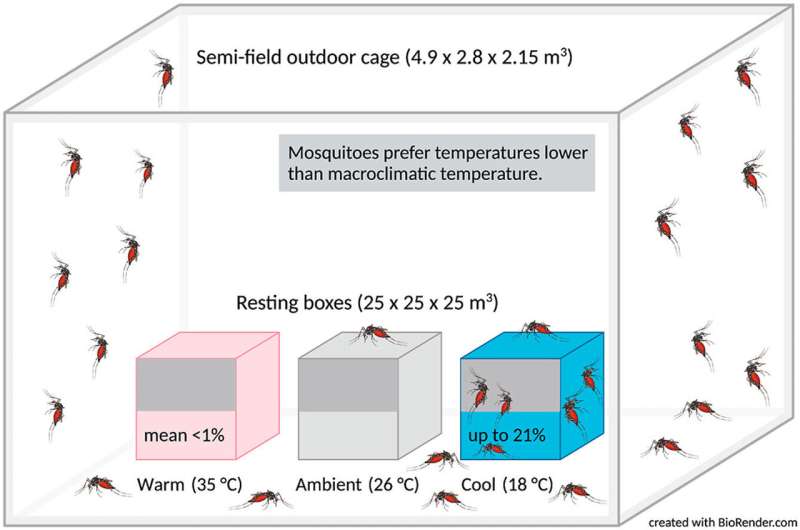This article has been reviewed according to Science X's editorial process and policies. Editors have highlighted the following attributes while ensuring the content's credibility:
fact-checked
proofread
Mosquitoes found to prefer cooler temperatures

Mosquitoes have thermal preferences. This is an important parameter to better predict outbreaks of diseases transmitted by these insects.
"If they have a choice, when it's hot, mosquitoes hide in a cool place to rest," says Niels Verhulst, author of a study recently published in the Journal of Thermal Biology. The entomologist from the University of Zurich summarizes the results of the experiment he conducted with his team. They have been working for several years to better understand mosquito behavior. These insects are vectors of many important pathogens for humans and animals, that cause dengue, West Nile fever or malaria, so it is crucial to be able to predict how their populations develop.
Four degrees lower is more restful
Verhulst's study examined for the first time outside a laboratory the thermal preferences of the insects. To this end, he observed the temperature of the places where the mosquitoes rested—an activity that occupies most of their time—when they were released in a large, special cage outdoors during the summer. Specifically, he introduced between 100 and 200 females of the species Aedes japonicus (Asian bush mosquito), into the cage on 19 occasions.
This cage was equipped with three resting boxes whose temperature had been treated to create a relatively cool microhabitat with approximately 18°C over the duration of the experiment and a warm microhabitat with approximately 35°C in addition to an untreated ambient microhabitat with approximately 26°C. Mosquitoes could freely enter and leave the boxes. For each trial, mosquitoes resting in the three boxes were counted five times, every two hours.
The researcher observed that among the resting boxes, the mosquitoes' preference was for the coolest box. This phenomenon became more and more pronounced during the day, as the ambient temperature increased. "Across the experiments, the resting temperatures of Aedes japonicus were on average four degrees lower than the ambient temperatures measured by the nearby weather station," Verhulst says.
These results need to be refined over longer periods of time and, in particular, with infected mosquitoes capable of transmitting diseases. Scientists do not know, for example, whether such mosquitoes also prefer cooler temperatures or whether they prefer warmer places to shed pathogens, the same way we do to get rid of a virus when we have a fever.
Microclimates that favor survival
In any case, the thermal preferences of mosquitoes are an important parameter to take into account in models for predicting disease transmission.
"Currently, models cannot correctly predict the development of mosquito populations and their pathogens since they are based on ambient temperatures measured by weather stations. However, these stations measure temperatures at an altitude of two meters in the middle of fields, where no mosquitoes are found anyway. Thus, based on this average temperature alone, a model could estimate that mosquitoes cannot survive in a certain area because it is too hot, while in reality, by finding cooler microclimates, the mosquito will be quite capable of reproducing and transmitting diseases," Verhulst explains. Refining the models by taking this parameter into account will also be important for predicting population movements of the insect in the wake of climate change.
More information: Raphaela Ziegler et al, Temperature preference of sugar- or blood-fed Aedes japonicus mosquitoes under semi-natural conditions, Journal of Thermal Biology (2023). DOI: 10.1016/j.jtherbio.2023.103592
Provided by Schweizerischer Nationalfonds SNF




















